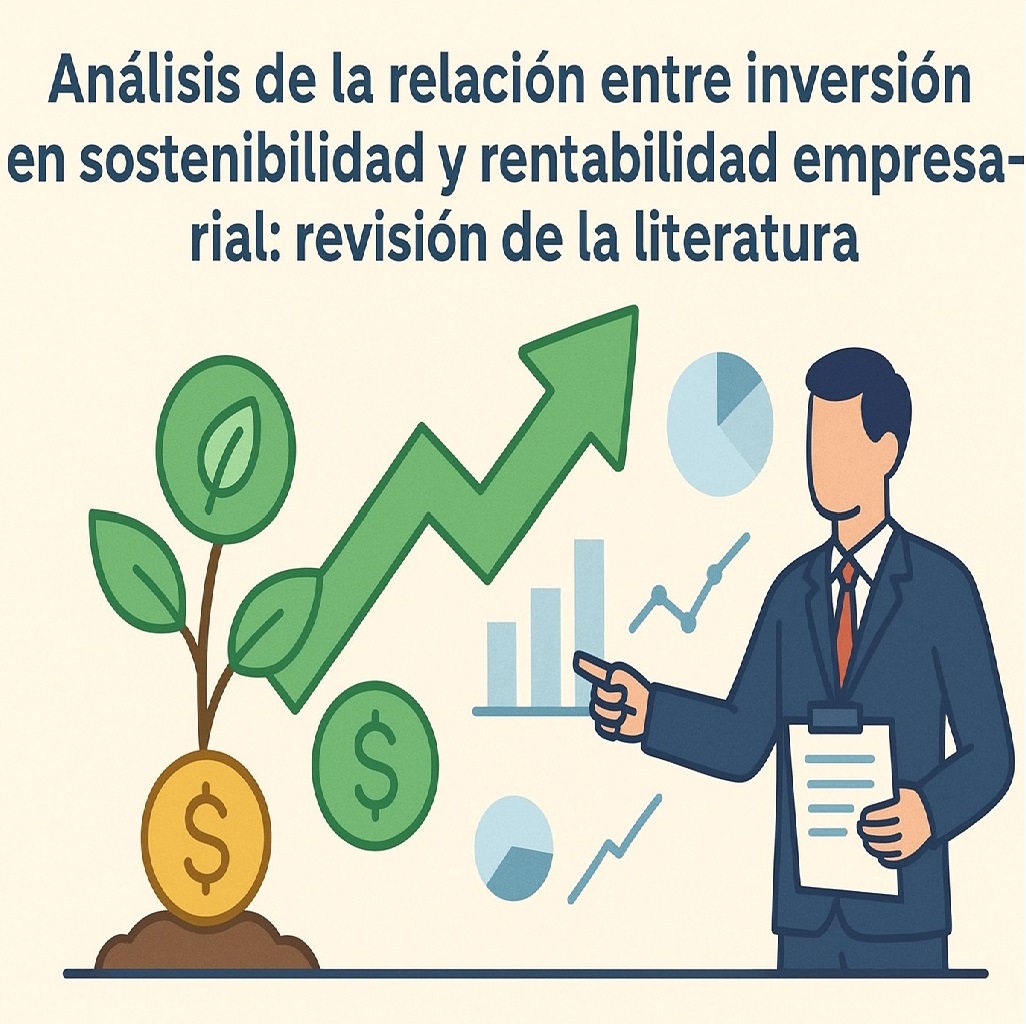Análisis de la relación entre inversión en sostenibilidad y rentabilidad empresarial: revisión sistemática de la literatura
DOI:
https://doi.org/10.37711/rcie.2025.5.2.4Palabras clave:
sostenibilidad, responsabilidad social corporativa, rendimiento empresarial, inversión sostenible, PRISMAResumen
Este artículo realiza una revisión sistemática de la literatura vigente para examinar la correspondencia existente entre la inversión en sostenibilidad, entendida a través de la responsabilidad social corporativa (RSC), y la rentabilidad empresarial. Utilizando el protocolo PRISMA, se seleccionaron 40 artículos cuantitativos publicados entre 2022 y 2025 en bases de datos Scopus y ProQuest, tras aplicar filtros de relevancia, acceso abierto y metodología. Los resultados evidencian una tendencia generalizada hacia una relación positiva entre la RSC y la rentabilidad financiera, aunque algunos estudios señalan impactos neutrales o negativos en función de factores contextuales como la cultura nacional, el tamaño de la empresa o la estrategia de implementación. Entre los beneficios asociados destacan el aumento de la productividad, la atracción de talento, la mejora de la reputación y la reducción de riesgos corporativos. Sin embargo, también se identifican desafíos relacionados con la liquidez, costos iniciales y percepción de los stakeholders. La conclusión subraya la necesidad de considerar las particularidades del entorno y del sector para maximizar los beneficios de la sostenibilidad empresarial, abriendo nuevas líneas de investigación sobre el impacto interno en los colaboradores y la vinculación con la marca empleadora.
Descargas
Referencias
Agapova, A., King, T., & Ranta, M. (2025). Navigating transparency: The interplay of ESG disclosure and voluntary earnings guidance. International Review of Financial Analysis, 97, 1-20. https://doi.org/10.1016/j.irfa.2024.103813
Aguinis, H., & Glavas, A. (2012). What We Know and Don’t Know About Corporate Social Responsibility: A Review and Research Agenda. Journal of Management, 38(4), 932-968. https://doi.org/https://doi.org/10.1177/0149206311436079
Ahmad, Z., Bin Hidthiir, M. H., Rahman, M. M., Junoh, M. Z. M., & Bin Yusof, M. F. (2025). Impact of TBL-Based CSR Disclosure on Financial Performance in Halal Food Companies: A System GMM Analysis. SAGE Open, 15(1), 1-16. https://doi.org/10.1177/21582440241296659
Akhtar, F., Senadjki, A., & Vija Kumaran, V. (2025). Sustainability meets digital culture: the influence of ESG on financial performance in Malaysian
manufacturing SMEs. Journal of Innovative Digital Transformation, 2(1), 90-108. https://doi.org/10.1108/JIDT-10-2024-0031
Al-Shaer, H., Uyar, A., Kuzey, C., & Karaman, A. S. (2023). Do shareholders punish or reward excessive CSR engagement? Moderating effect of cash flow and firm growth. International Review of Financial Analysis, 88, 1-20. https://doi.org/10.1016/j.irfa.2023.102672
Alkandi, I., Alhajri, N., & Alnajim, A. (2025). Green Supply Chain Management, Business Performance, and Future Challenges: Evidence from Emerging Industrial Sector. Sustainability, 17(1), 1-36. https://doi.org/10.3390/su17010029
Alshahrani, S. T., & Iqbal, K. (2024). How does green human resource management foster employees’ environmental commitment: A sequential mediation analysis. Heliyon, 10(12), 1-11. https://doi.org/10.1016/j.heliyon.2024.e33202
Aslan-Cetin, F., Öztürk, S., & Akarsu, O. N. (2024). The Effect of ESG Data of Companies on Financial Performance: A Panel Data Analysis on The BIST Sustainability Index. Sosyoekonomi, 32(61), 125-146. https://doi.org/10.17233/sosyoekonomi.2024.03.07
Aydogan, E., & Kara, E. (2023). The Analysis of The Dynamic Relationship between Corporate Sustainability and Financial Performance. Business and Economics Research Journal, 14(2), 199-216. https://doi.org/10.20409/berj.2023.407
Bashir, M. (2022). Corporate social responsibility and financial performance-the role of corporate reputation, advertising and competition. PSU Research Review: An International Journal, 8(2), 389-402. https://doi.org/10.1108/PRR-10-2021-0059
Becea, L.-M., & Osoian, C. (2025). Green HRM and CSR as Antecedents of Organisation Financial Growth. Studia Universitatis Babes-Bolyai Oeconomica, 70(1), 33-50. https://doi.org/10.2478/subboec-2025-0002
Bui, H. T. T., Nguyen, V. H. C., Le, N. A. K., Dang, N. T. H., & Khoi Nguyen, P. N. (2024). The Roles of Corporate Social Responsibility and Perceived Organizational Support on Employee Loyalty in the Vietnamese Public Sector. SAGE Open, 14(4), 1-18. https://doi.org/10.1177/21582440241293574
Carroll, A. B. (1991). The Pyramid of Corporate Social Responsibility: Toward the Moral Management of Organizational Stakeholders. Business Horizons, 34(4), 39-48. https://doi.org/https://doi.org/10.1016/0007-6813(91)90005-G
Carroll, A. B., & Shabana, K. M. (2010). The business case for corporate social responsibility: A review of concepts, research and practice. International Journal of Management
Reviews, 12(1), 85-105. https://doi.org/10.1111/j.1468-2370.2009.00275.x
Chakroun, S., Ben Amar, A., & Ben Amar, A. (2022). Earnings management, fnancial performance and the moderating effect of corporate social responsibility: evidence from France. Management Research Review, 45(3), 331-362. https://doi.org/10.1108/MRR-02-2021-0126
Chen, J., & Rojniruttikul, N. (2025). Influence of a Green Environmental Orientation on Corporate Sustainable
Performance in the Manufacturing Sector. Sustainability, 17(6), 1-18. https://doi.org/10.3390/su17062430
Davis, K. (1960). Can Business Afford To Ignore Social Responsibilities? California Management Review, 2(3), 70-
76. https://journals.sagepub.com/doi/10.2307/41166246
DeGhetto, K., Russell, Z. A., & McAllister, C. P. (2024). Corporate social responsibility and employee outcomes: considering employee perspectives on the role of business. Society and Business Review, 19(2), 266-285. https://doi.org/10.1108/SBR-10-2022-0262
Dobre, C., Baba, C. M., Anton, C. E., Zamfrache, A., & Aldea, D. (2025). Sustainability Reporting and Environmental
Responsibility: The Case of Romania. Administrative Sciences, 15(3), 1-31. https://doi.org/10.3390/admsci15030103
Elkington, J. (2004). Enter the Triple Bottom Line. En A. Henriques Add Up? (pp. 1-16). Routledge. https://johnelkington.com/archive/TBL-elkington-chapter.pdf
Gandasari, D., Tjahjana, D., Dwidienawati, D., & Ichsan, M. (2024). How to attract talents? The role of CSR, employer brand, benefts and career development. Cogent Business & Management, 11(1), 1-15. https://doi.org/10.1080/23311975.2024.2323774
Haider, W., Tunio, F. H., Arshad, M. U., & Ferreira, P. J. S. (2025). Nexus Between Corporate Sustainability Reporting and Risk
Luo, S., Sun, Z., & Zhang, X. (2024). Does green marketing improve corporate performance? International Review of Economics & Finance, 97, 1-10. https://doi.org/10.1016/j.iref.2024.103762
Ma, S., & Ma, T. (2025). ESG Controversies and Firm Value: Evidence from A-Share Companies in China. Sustainability, 17(6), 1-26. https://doi.org/10.3390/su17062750
Manta, F., Boscia, V., Conca, L., Borgia, M., & Toma, P. (2025). The Impact of Bank Riskiness on the Quality of ESG Disclosure: Empirical Evidence From European Banks. Business Strategy and the Environment, 34(4), 4206-4226. https://doi.org/10.1002/bse.4193
Maqbool, S., & Zamir, N. (2021). Corporate social responsibility and institutional investors: the intervening effect of fnancial performance. Journal of Economic and Administrative Sciences, 37(2), 238-252. https://doi.org/10.1108/JEAS-08-2019-0089
Mitigation: Evidence from Chinese Listed Firms. Sustainability, 17(4), 1-32. https://doi.org/10.3390/su17041622
Hayat, M., & Iqbal, A. (2025). Corporate social responsibility in the era of globalization: Balancing proftability and sustainable practices. Arabian Journal of Business and Management Review, 14(1), 19-25. https://j.arabianjbmr.com/index.php/kcajbmr/article/view/1257
Hou, J. (2024). How Does Corporate Social Responsibility Affect Corporate Productivity? The Role of Environmental Regulation. Sustainability, 16(15), 1-22. https://doi.org/10.3390/su16156426
Hsiao, H. F., Zhong, T., & Wang, J. (2024). Does national culture influence corporate social responsibility on frm performance? Humanities & Social Sciences Communications, 11, 1-9. https://doi.org/10.1057/s41599-023-02538-5
Isaksson, L. E. (2025). Corporate Social Responsibility Trajectory: Mining Reputational Capital. Administrative Sciences, 15(3), 1-25. https://doi.org/10.3390/admsci15030095
Kabbera, S., Tibaingana, A., Kiwala, Y., & Mugarura, J. T. (2024). Environmental practices and the growth of small and medium agro-processing enterprises in Uganda. Cleaner and Circular Bioeconomy, 8, 1-12. https://doi.org/10.1016/j.clcb.2024.100090
Li, J., & Jin, X. (2024). The Impact of Artifcial Intelligence Adoption Intensity on Corporate Sustainability Performance: The Moderated Mediation Effect of Organizational Change. Sustainability, 16(21), 1-21. https://doi.org/10.3390/su16219350
Liu, Y., Li, Y., & Chen, H. (2025). The Keywords in Corporate Social Responsibility: A Dictionary Construction Method Based on MNIR. Sustainability, 17(6), 1-23. https://doi.org/10.3390/su17062528
Meng, X., & Imran, M. (2024). The impact of corporate social responsibility on organizational performance with the mediating role of employee engagement and green innovation: evidence from the Malaysian banking sector.
Economic Research-Ekonomska Istrazivanja, 37(1), 1-27. https://doi.org/10.1080/1331677X.2023.2264945
Michalski, L., & Low, R. K. Y. (2024). Determinants of corporate credit ratings: Does ESG matter? International Review of Financial Analysis, 94, 1-23. https://doi.org/10.1016/j.irfa.2024.103228
Minh Vu, G. T., Dao, M.-H., & Hoang, K. (2025). Does corporate integrity affect frm efciency? Borsa Istanbul Review, 25(1), 94-106. https://doi.org/10.1016/j.bir.2024.12.018
Mohamad Ariff, A., Kamarudin, K. A., Musa, A. Z., & Mohamad, N. A. (2024). Financial constraints, corporate tax avoidance and environmental, social and governance performance. Corporate Governance, 24(7), 1525-1546. https://doi.org/10.1108/CG-08-2023-0343
Moher, D., Liberati, A., Tetzlaff, J., & Altman, D. G. (2009). Preferred reporting items for systematic reviews and meta-analyses: The PRISMA statement. BMJ, 339(7716), 332-336. https://doi.org/10.1136/bmj.b2535
Perticas, D. C., Florea, A. G., Borodin, V., Hajjaj, M., & SabauPopa, C. D. (2025). The Study on Corporate Sustainability Entrepreneurship in Romania: Analysis on Dependencies of Economical State of the Corporation on Their Green Politics Through Eyes of Their Management. Sustainability, 17(5),
1-25. https://doi.org/10.3390/su17052231
Rasool, N., Arunachalam, M., Wellalage, N. H., & Kumar, V. (2025). Unveiling the Relationship Between ESG and Growth of Unlisted Firms: Empirical Insights From Eastern Europe and Central Asia. Business Strategy and the Environment, 34(5), 5669-5686. https://doi.org/10.1002/bse.4257
Schneider, A., Kayser, C., Retsch, B. T., Thun, T. W., & Zülch, H. (2025). Sustainability integration matters! A German perspective on fnancial top and bottom line performance. Journal of Cleaner Production, 501, 1-14. https://doi.org/10.1016/j.jclepro.2025.145309
Shalhoob, H. (2025). ESG Disclosure and Financial Performance: Survey Evidence from Accounting and Islamic Finance. Sustainability, 17(4), 1-26. https://doi.org/10.3390/su17041582
Shmelev, S. E., & Gilardi, E. (2025). Corporate Environmental, Social, and Governance Performance: The Impacts on Financial Returns, Business Model Innovation, and Social Transformation. Sustainability, 17(3), 1-41. https://doi.org/10.3390/su17031286
de Souza Barbosa, A., da Silva, M. C. B. C., da Silva, L. B., Morioka, S. N., & de Souza, V. F. (2023). Integration of Environmental, Social, and Governance (ESG) criteria: their impacts on corporate sustainability performance. Humanities & Social Sciences Communications, 10, 1-18. https://doi.org/10.1057/s41599-023-01919-0
Taher, A., & Rizkalla, A. (2024). How brand CSR responses to the pandemic impact brand value, growth, and rank. Humanities & Social Sciences Communications, 11, 1-8. https://doi.org/10.1057/s41599-024-03711-0
Tao, R., Wu, J., & Zhao, H. (2023). Do Corporate Customers Prefer Socially Responsible Suppliers? An Instrumental Stakeholder Theory Perspective. Journal of Business Ethics, 185, 689-712. https://doi.org/10.1007/s10551-022-05171-5
Van, L. T.-H., Lang, L. D., Ngo, T. L.-P., & Ferreira, J. (2024). The impact of internal social responsibility on service employees’ job satisfaction and organizational engagement. Service Business, 18, 101-131. https://doi.org/10.1007/s11628-024-00555-1
Visser, W. (2010). The Age of Responsibility: CSR 2.0 and the New DNA of Business. Journal of Business Systems, Governance and Ethics, 5(3), 7-22. https://www.researchgate.net/publication/228188599_The_Age_of_Responsibility_CSR_20_and_the_New_DNA_of_Business
Wang, S., Chen, F., & Yang, X. (2024). Environmental, social and governance performance: Can and how it improve
internationalization of Chinese A-share listed enterprises.Heliyon, 10(13), 1-18. https://doi.org/10.1016/j.
heliyon.2024.e33492
Wood, D. (1991). Corporate Social Performance Revisited. Academy of Management Review, 16(4), 691-718. https://journals.aom.org/doi/abs/10.5465/amr.1991.4279616
Xu, S., Li, H., Chen, J., Huo, J., & Kuang, X. (2024). Sustainable competitiveness through ESG performance: An empirical study on corporate resilience. Journal of Competitiveness, 16(3), 53-72. https://doi.org/10.7441/joc.2024.03.03
Xue, R., & Chen, J. (2025). ESG performance and stability of New Quality Productivity Forces: From perspective of
China’s modernization construction. International Review of Economics & Finance, 98, 1-13. https://doi.org/10.1016/j.iref.2025.103911
Yun, J., & Lee, J. (2022). Analysis of the Relationship between Corporate CSR Investment and Business Performance Using ESG Index—The Use-Case of Korean Companies. Sustainability, 14(5), 1-14. https://doi.org/10.3390/su14052911

Descargas
Publicado
Número
Sección
Licencia
Derechos de autor 2025 Enrique Stefano Hurtado Feria, Eduardo Rodrigo Quiñones Carrasco

Esta obra está bajo una licencia internacional Creative Commons Atribución 4.0.
Los autores retienen los derechos de propiedad intelectual de las obras publicadas en la RCIE, y ceden a la revista únicamente el derecho de primera publicación. Esto significa que los autores pueden reutilizar y difundir su trabajo posteriormente, siempre que se haga mención a la publicación original en esta revista y se respeten los términos de la licencia CC BY.















